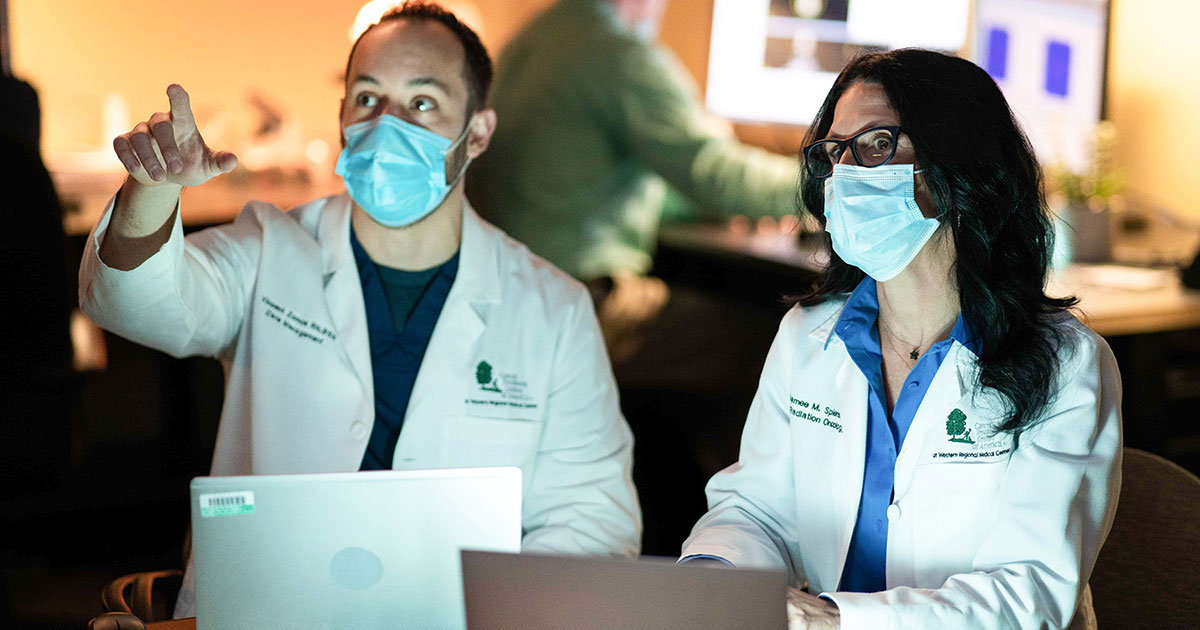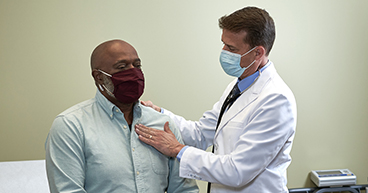
Every individual on the planet is unique in some way. Even identical siblings have physical and personality traits that separate one from the other. So, doesn’t it make sense that cancers, no matter how similar the diagnosis, will also be unique in some way? A treatment plan for one patient’s diffuse large B-cell non-Hodgkin lymphoma may differ from another’s. Age, sex, health history and overall health also play a factor.
That’s why it may be hard to pin down who may be on any given patient’s care team. When a patient walks through a door of a cancer center, he or she may follow any number of paths to get diagnosed and treated. One patient may need chemotherapy, while another requires radiation therapy or surgery. One person may have digestive side effects, while another may be dealing with pain or neuropathy.
A cancer diagnosis may be scary and overwhelming. But, regardless of your diagnosis and the path you follow on your cancer journey, it’s important to remember that you don’t have to face it alone. You should have a team of providers who are experts in cancer care. And having a better understanding what each person does may help you feel more at ease as you move forward with your care.
Learn how to sign up for personalized nutrition and wellness services.
Who’s who?
Here’s a comprehensive glossary of people who may be part of a cancer care team:
Oncologists are doctors who specialize in cancer. Under the oncology umbrella are doctors who focus on specific aspects of cancer care. For instance:
- Medical oncologists are the doctors who typically oversee a patient’s care. They’re experts in diagnosing and treating a wide range of adult cancers.
- Gynecologic oncologists treat women with cancers of the reproductive system. Like medical oncologists, they prescribe cancer drugs, but also perform surgeries.
- Radiation oncologists specialize in using radiation to treat cancer. Radiation oncologists may also be part of a larger care team that creates, reviews and interprets images taken of areas inside the body. That team may include radiologists, radiographers, radiation therapists and interventional radiologists and perform scans like CT scans, MRIs or X-rays to diagnose or monitor cancer.
- Urologic oncologists focus on cancers of the kidney, bladder and the male reproductive system.
- Hematologist-oncologist are trained to diagnose and treat blood cancers, such as leukemia, lymphoma and multiple myeloma.
- Surgical oncologists are trained to remove tumors and perform biopsies and other cancer-related surgical procedures. Not all surgeons who treat cancer patients are surgical oncologists. Other surgeons may be trained specifically in breast surgery, reconstructive surgery, orthopedic surgery, gastrointestinal surgery or other disciplines.
Learn more about different oncology specialties and radiology disciplines.
Oncology nurses have expertise in treating and caring for cancer patients. Some of their responsibilities may include assisting with physical exams, administering chemotherapy or medications, and communicating with the patient and caregiver.
Advanced providers include oncology nurse practitioners (NPs) and oncology physician assistants (PAs). They may also perform physical examinations and conduct research with cancer patients for a clinical trial. These providers may also be involved with diagnosing cancer, interpreting lab results and assisting with surgery.
Palliative or supportive care doctors and nurses may work with a patient and an oncology team to reduce side effects of cancer treatment.
Dietitians may help patients with nutritional guidance during treatment. They may make recommendations for how to cope with symptoms like weight and appetite loss and mouth sores.
Rehabilitation therapists include physical therapists, occupational therapists, speech therapists and recreational therapists. They help patients restore and maintain their function during and after treatment.
Patient navigators or educators are with a patient from diagnosis through survivorship. They provide resources for various issues that may come up, including mental health and financial needs, while also coordinating communication with the rest of the care team, answering the patient’s questions, scheduling appointments and assisting with other logistical needs.
Oncology social workers and mental health providers help the patient, loved ones and caregivers cope with a cancer diagnosis. Cancer brings both physical and emotional challenges. These providers may provide support and referrals to resources, such as counseling or a spiritual support advisor.
What to ask
Cancer care is all about you. So, you should not hesitate to ask questions about the treatment you are or are not receiving. Here are some questions you may consider asking your team:
- Who will be on my cancer care team? What will their roles be in helping me during and after treatment?
- Where are my cancer care team members located? Are they all affiliated with the same hospital or treatment facility, or will I see them at different locations?
- Which doctor is overseeing my care?
- Who should I speak to if I have questions? Do I have one point of contact, or does my contact depend on what my question is?
- Who should I contact in an emergency situation, and how should I get in touch with them?
- Who should I speak with about mental health issues I’m experiencing?
- Will my health insurance cover all these services? What should I do if I’m experiencing financial hardships?
Meeting your team
Cancer appointments may feel like a whirlwind. Here are a few tips that may help you prepare:
Bring something to write with or record: You may receive a lot of information at appointments. Taking notes or recording (with a doctor’s permission) on your cell phone or other device may help you recall useful information later.
Write down questions and concerns: Keep a notebook handy at home to jot down questions or concerns for your next appointment.
Bring a loved one: Treatment may be physically and emotionally exhausting. Having someone drive you may allow you to feel less alone, or provide the support and help you need if you’re not feeling strong enough to make the trip by yourself.
From angiogenesis to zoledronate: Get a primer on cancer jargon.


